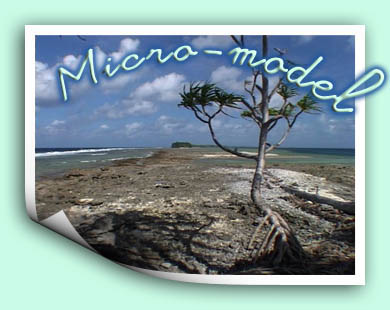. 
The Amatuku Micro model is part of the 10-year Small is Beautiful (SIB) project, which objective is to help Tuvalu become a sustainable model nation. Small is Beautiful begun in 2005 after a film in 2003 and government and population consultations in 2004. Its first step, the Alofa Tuvalu Renewable Energy Study 2005-2006 by Pierre Radanne & Sarah Hemstock highlighted the importance of training on renewable energies. Their main recommendation, a Micro model, was to offer to the Tuvaluan people a micro example where they can learn hands on, and from which they can chose to reproduce in their communities…
Beyond Tuvalu, progress will be communicated via various media in the hope that our local examples can be reproduced or adapted to similar communities worldwide.
Our thanks to ADEME (French Environment and Energy Management Agency), Pacific Fund/French Embassy in Fiji and SOPAC to have helped start this project.





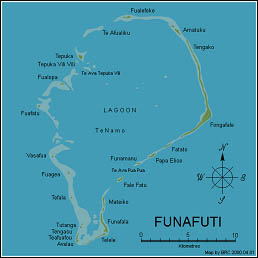 The Tuvalu National Renewable Energy Demonstration and Training Centre is to provide an ongoing "showroom" facility where Tuvaluan are introduced and trained on how to make, maintain and implement locally appropriate renewable energies in order to spread their use throughout Tuvalu and reduce the nation’s dependency on fossil fuel. The centre highlights the importance of combined renewable energies in mitigating climate change and other environmental issues. It is an effective practical 1st step on the way to a national program. The Tuvalu National Renewable Energy Demonstration and Training Centre is to provide an ongoing "showroom" facility where Tuvaluan are introduced and trained on how to make, maintain and implement locally appropriate renewable energies in order to spread their use throughout Tuvalu and reduce the nation’s dependency on fossil fuel. The centre highlights the importance of combined renewable energies in mitigating climate change and other environmental issues. It is an effective practical 1st step on the way to a national program.
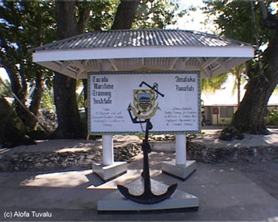 Why Amatuku and TMTI? Why Amatuku and TMTI?
Amatuku is a small (0,1km2) inhabited islet, 8.05 kilometers northwest from the centre of Funafuti, Tuvalu's capital. With approximately 100 residents calling it home -- students of the Tuvalu Maritime Training Institute (TMTI), the institute's teachers, staff and families. The islet is physically close (20 mn boat ride) to Funafuti, Tuvalu's most populous and most easily accessible supply centre and administrative/communications hub.
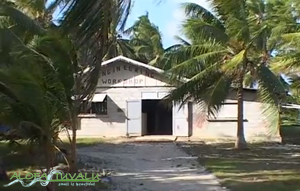 TMTI, a training institute, provides a solid project base. While its discipline is stricter than in the rest of Tuvalu, it is that very discipline that significantly raises the chances that this first project will be a success, be accomplished more rapidly and be sustainable after project workers have left. Among other assets, the islet already possesses significant and well-equipped work space and technical personnel, all of which are generally lacking in the rest of Tuvalu. This lack has, in past efforts in Tuvalu and the South Pacific region, had a high cost in terms of the follow-up required to maintain both programs and equipment. Furthermore, lack of training for local technicians throughout the islands has been a major obstacle in Tuvalu's general development and in the on-going use of many of the environmentally effective technologies available today. As SIB expands into a nation-wide program, the Amatuku micro-model will thus become a central National Maintenance and Training Centre supporting smaller maintenance facilities on the outer islands. This structure will allow Tuvalu to avoid repeating its past mistakes… and enable efficient and economical system maintenance. TMTI, a training institute, provides a solid project base. While its discipline is stricter than in the rest of Tuvalu, it is that very discipline that significantly raises the chances that this first project will be a success, be accomplished more rapidly and be sustainable after project workers have left. Among other assets, the islet already possesses significant and well-equipped work space and technical personnel, all of which are generally lacking in the rest of Tuvalu. This lack has, in past efforts in Tuvalu and the South Pacific region, had a high cost in terms of the follow-up required to maintain both programs and equipment. Furthermore, lack of training for local technicians throughout the islands has been a major obstacle in Tuvalu's general development and in the on-going use of many of the environmentally effective technologies available today. As SIB expands into a nation-wide program, the Amatuku micro-model will thus become a central National Maintenance and Training Centre supporting smaller maintenance facilities on the outer islands. This structure will allow Tuvalu to avoid repeating its past mistakes… and enable efficient and economical system maintenance.
A pioneering project
a) No biomass dependant RET’s have been demonstrated in a coral atoll environment. This project is an approach to sustainable energy production.
b) It will focus on training women as technicians. Since biogas will be used as domestic cooking fuel, women will be directly involved in training for use, maintenance and construction of biogas applications. As part of Alofa Tuvalu’s 2005 activities in Tuvalu, women have been sensitized to biogas technology and have committed themselves to training, maintaining and utilizing this technology.
It’s using Amatuku in Tuvalu, the symbolic most vulnerable nation, as an example to a global audience, highlighting the importance of combined renewable energies, in climate change issues and therefore contributing to Tuvalu future survival. |
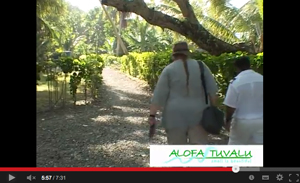
Watch the 2005 Survey Trip in Amatuku
Micro Model, on  |


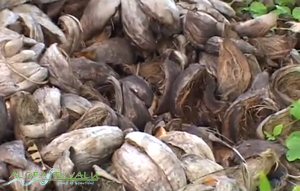 BIOMASS BIOMASS
All possible options of locally available renewable energies will be studied for the Amatuku Pilot Project, both for « off grid » and « on grid » use. Biomass energy can be converted into fuels, electricity and processed heat. Biomass energy sources currently supply around 16 % of the world's primary energy making biomass the world's fourth largest energy source. In Tuvalu, as in many developing or industrialized countries, there is a large untapped biomass energy potential. Bioenergy programs are well suited to Tuvalu as they can be used at small and larger scales in a decentralized manner bringing substantial benefits both to rural and urban areas. Residues from forestry (re-planting, bush clearance), agricultural activities (pig rearing) and organic waste, as well as coconuts from existing productive trees are invaluable as an immediate and relatively cheap energy resource to provide the initial feedstock in the development of a larger bioenergy industry.
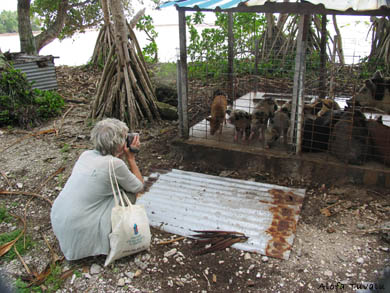 Biogas objective Biogas objective
Implementation of biogas production will be analyzed based on the use of 2 operational biogas plants, one running on the manure of a 35-pig pen for which sanitary housing will be built, and the other on the human waste produced by TMTI students. The output of the biodigesters not only will produce methane but the best compost as well, which is important in Tuvalu where arable land is on the decline both in quantity and quality. Due to the innovative aspect of the project and the specific conditions of an atoll island, we will solve technical challenges such as testing the best material for storing waste or gas or distributing the waste to the digesters. Objectives:
· Provide domestic fuel for students and staff houses and kitchen
· Reduce animal slurry entering environment
. Training Engineers, students, Tuvalu population and beyond
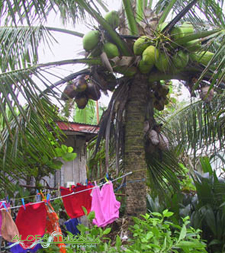 Biodiesel objective Biodiesel objective
Several activities will happen simultaneously in the biodiesel field:
· Implement a small coconut oil production facility with the available stock,
· Clarification of the melting, solidifying temperature & energy content,
· Carry out a complementary study to finalize detailed analysis of potential coconut oil and biodiesel production,
. Training Engineers, students, Tuvalu population and beyond
The biodiesel produced can have a number of end uses such as transport fuel & electricity generation. On Amatuku, the objective is to supply 20% of fuel for the islet electricity generator and diesel for TMTI small boats, making it that much less dependent on oil and standard diesel in addition to reducing CO2 emissions.
WIND
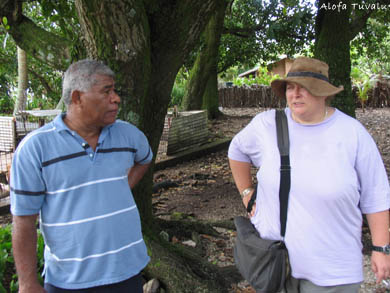 Wind energy is a mature technology providing machines with a wide range of capacities (from 10 kW to 5,000 kW for offshore wind farms) and energy in a wide number of countries. However, there is still little experience in the small Pacific islands area. The first unit (20 kW) has been built in the Suva SOPAC office by a French manufacturer, Vergnet, who specialized in windmills for tropical conditions. The Fijian site has been chosen essentially for training conditions and the location has poor wind potential. Wind energy is a mature technology providing machines with a wide range of capacities (from 10 kW to 5,000 kW for offshore wind farms) and energy in a wide number of countries. However, there is still little experience in the small Pacific islands area. The first unit (20 kW) has been built in the Suva SOPAC office by a French manufacturer, Vergnet, who specialized in windmills for tropical conditions. The Fijian site has been chosen essentially for training conditions and the location has poor wind potential.
Our objectives concerning wind energy during the next 30 months are:
· To select a site on Amatuku and Fongafale where to install wind measure equipments. After one year measurement we'll have a better idea of the installation size and we'll be able to calculate the expected electricity production.
· To analyze data and select the adequate equipment.
· To lay foundation and install the windmill.
Another option would be to install a horizontal blades WindsideTM windmill which can function starting 3 m/s. They meet the requirements of demanding professional use: long life span, efficiency, durability and minimum need of maintenance. Windside produces electricity at least 50 % more in a year than traditional propeller models. All year round. It has been used in extreme conditions from Greenland to the Sahara since 26 years.
. To train engineers, users and Tuvaluan at large.
SOLAR
In regard to solar electric, aside from the initial investment, still a bit high, and more rigorous maintenance required due to the highly saline environment, there's no doubt that photo-voltaics are viable in Tuvalu. This would be used for electricity, desalinisation and sanitary hot water production. Our intention is to use new generation of technologies which have been used elsewhere and are adapted to this environment. The idea is not to make of Tuvalu a laboratory!


Wider societal
The "Amatuku Micro-model" is fulfilling the request from the Tuvaluan government to the French foreign affairs ministry about renewable energy. Its implementation in Tuvalu reinforces its participation to the PIGGAREP (Pacific Islands Green house Gas abatement Through Renewable Energy Project)'s goals to achieve CO2 emission reduction.
Our project provides fuel security and reduces Tuvalu's dependence on imported oil, reducing the amount of money leaving Tuvalu. Using bioenergy on Tuvalu's outer islands to provide a reliable electricity supply will also create local industries, increase income as manpower and improve quality of life thus reducing migration to Funafuti.
Tuvaluans will learn how to make, maintain and implement locally appropriate renewable energies. Additionally, the role of women, who play a central role in energy use, has largely been ignored. Women are at the centre of energy use and must play a full part in energy policy development and implementation. That is why they are completely integrated in our project.
This will increase sensitivity and awareness among the Outer Islands population for these new methods of energy production, waste and other issues included in the project.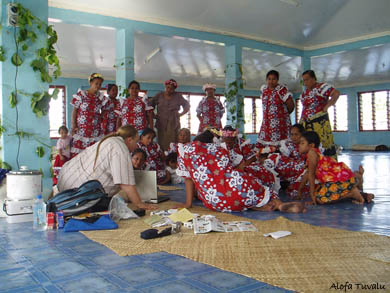
In 2 years, 200 TMTI students, 100 women will be trained in biogas and biodiesel operations and maintenance. 300 Tuvaluans (men and women) trained in digester operations and maintenance. 50 people involved in construction and training.
As a feasibility test for SIB's national implementation, Amatuku will become a de-facto training centre for the rest of Tuvalu.
Ongoing communications about the Amatuku pilot raises the likelihood of it becoming an example which can be reproduced in other places beyond Tuvalu, accelerating one of SIB's primary goals of « spreading the word » that solutions to a number of the world's environmental problems exist and are DOABLE.
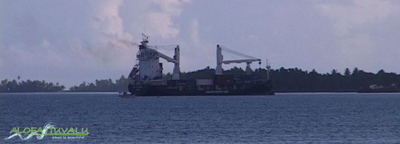 Economy and environment Economy and environment
Our project could reinforce competitiveness of Tuvalu toward other pacific islands such as Fiji, by creating a central National Maintenance and Training Centre on renewable energy, the first one in the Pacific area.
At a national scale, using renewable energies will induce progress on energy efficiency & decrease the weight of the country imports of oil in electricity generation, as well as :
· Reduce the amount of pollution & GHG's entering the atmosphere firstly by replacing polluting fossil fuels & secondly as they are zero net carbon emitters when used sustainably.
· Strengthen Tuvalu's case in climate change negotiations.
· Protect Tuvalu's energy supply from the whims of the international market.
· Using biogas digestion can help reduce waste and pollution, run-off & contamination from organic waste, including human & animal sewage, therefore preventing land, sea & groundwater contamination.
· The slurry produced from the digestion process can be used to improve soil quality & fertility, in areas where it is heavily contaminated, such as salt contaminated soil from sea water flooding. 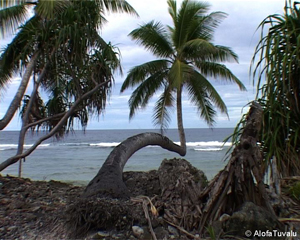
· The re-introduction of copra production for biodiesel will have many multiplier effects: provide income to outer islands; reduce oil imports; increase biodiversity by replacing old coconut trees & re-foresting degraded areas; provide timber as old trees are cut & replaced; provide a carbon neutral energy source; provide much needed jobs in rural areas.
· At current population & food import levels there does not appear to be any competition between land use for food and fuel. In fact, an integrated bioenergy & agricultural extension plan would increase the amount of food produced in Tuvalu whilst decreasing the amount of waste since compost would be produced as a consequence of waste processing. Where land & soil is scarce, compost can be used to extend the "family gardens" project, and help decrease the amount of household income spent of food.
A replicable "Model"
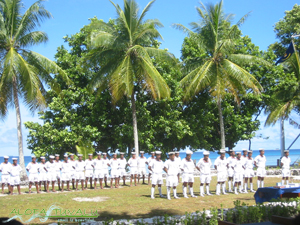 The "Amatuku micro-model" is designed to continue. It is the heart of the project itself. The only Amatuku islet residents are the maritime training school students and staff; the set up is the key of success for continuous training. Alofa Tuvalu's scientists, project managers, implementation partners and local coordinators will follow up on site all stages of Amatuku micro model and beyond. Our aim is to reproduce the model in other islands of Tuvalu, then in the Pacific region as well as in the world via international communication. The "Amatuku micro-model" is designed to continue. It is the heart of the project itself. The only Amatuku islet residents are the maritime training school students and staff; the set up is the key of success for continuous training. Alofa Tuvalu's scientists, project managers, implementation partners and local coordinators will follow up on site all stages of Amatuku micro model and beyond. Our aim is to reproduce the model in other islands of Tuvalu, then in the Pacific region as well as in the world via international communication.
Operating on the basis that Tuvalu is a microcosm of the threat that we all face in the near or long-term, two primary objectives need to be addressed at the global level:
Creating a chain-reaction by initiating similar programs to follow the Tuvalu model. This will be done first through regular media communication about what is actually happening in Tuvalu, then by emulating the methods used on Tuvalu. The work done on Tuvalu, and experience gained, will be used in either direct reproduction in ecologically similar regions, such as small insular states, or by adapting some of the program's innovative ideas to other types of environments, stimulating actions in different regions and communities.
Raising awareness, on a large scale, about the threat Tuvalu faces and about our individual impact on global warming in order to foster increased individual action.
Accomplishing such a model of « environmental sanity » and greater self-sufficiency would not only create the most positive kind of example to the world, it would also solve some of Tuvalu's most pressing waste and energy problems.


Since 2005, we had to face issues and resolve unpredictable problems, we surfed on local and regional rythms and not exactly reliable regional transports or political stability… We worked with 4 consecutive governments and 6 captains… We learnt our lessons and probably could have done better…
Meanwhile, the Tuvaluan people and beyond got introduced, and trained for some, to biomass simple technologies… Duplications were initiated and in 2009, the Minister of Energy committed for Tuvalu to become fossil fuel independent by 2020… Reproduction and energy independence being the main objectives of our project, we feel that we did the job and this is gratifying.












Amatuku the Micro model started in 2005 with community awareness meetings and discussions with local partners, Government and TMTI captain, team & students. In 2006, after the Training Centre's presentation to Cabinet and agreement with concerned Ministries, the Governor General in parliament opening speech expressed the Government's will to see this demonstration and training centre happen, as well as its determination and commitment to Renewable Energy Technologies. In October the same year a MOU was signed with TMTI and the last technical biogas surveys and plans took place.


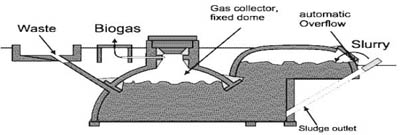
For the first biogas digester to be built on a coral atoll, Sikeli Raisuqe, Alofa Tuvalu biogas specialist, chose the Camartec dome that is built in bricks and underground. A challenge! A 40 to 50 pigs housing, built according to gravity was designed and built as well.
Specific technical issues had to be dealt with as well as transportation problems for the tons of equipment and material (concrete, bricks, wood etc) purchased in Fiji. The 2006 Fiji « coup » was part of the issue.
Thanks to the assistance of many agencies, directions and individuals alike in April 2007, the implementation of the Biogas digester and Model piggery was officially launched, with ADEME, SOPAC and the Government of Tuvalu as main partners. Other partners included the French Union of Engineers, the French Embassy and the American Embassy in Fiji. Our communication about the project early 2006 also attracted the attention of Piggarep, a programme that was not official yet. Alofa Tuvalu assisted with financial commitment letters from our funders for Piggarep to get off the ground. We advanced funds and after years of arm wrestling with the Piggarep manager, at his departure, in 2010, Sprep recognizing our rights, elegantly offered an indemnity without having to dig in the past… 10% of what we counted on was unsufficient to cover advances but it is good for the "morale" when ethics are somehow respected… and… it did not keep us from doing what we said we would do… or close to.
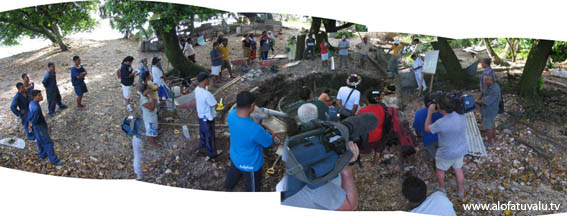
The 8m3 biogas running from the manure of 40-50 pigs in sanitary housing, was built from May to June 2007.
During eight weeks, 4 people have been fully trained in the construction of biogas digesters (3 from Tuvalu and 1 from Solomon Islands). 4 workshops on construction, operation & maintenance have been held with a total number of 198 attendees, of which around 60% were women and 10% selected TMTI students.
The residents decided to feed a communal kitchen with the gas produced and the compost by-product -important in Tuvalu where arable land is on the decline both in quantity and quality due to sea water contamination-, has been used to grow vegetables for consumption by TMTI staff & students.
50 people were involved in construction and training, including students. They were also trained in horticulture, unabling them to promote these activities when they return to their home islands.


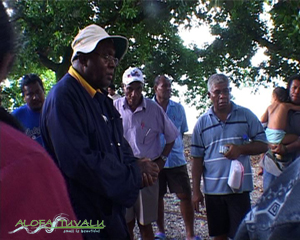 Early 2008, Sikeli Raisuqe returned to check the issues: gas produced was weak. There was not enough water in the digester. The captain also reported that residents had problems having to share pigpens. Therefore there were less pigs than planned. Early 2008, Sikeli Raisuqe returned to check the issues: gas produced was weak. There was not enough water in the digester. The captain also reported that residents had problems having to share pigpens. Therefore there were less pigs than planned.
Other issues had to be looked into early 2009. Sikeli returned to find the digester flooded with water and, more serious, the gas pipe had been maliciously cut by the officer paid for the job. The officer was replaced. Alofa Tuvalu bought a pump and around 3000 liters of water were pumped out. The new officer, TMTI administrative officer, Lee Faiva Moresi, wrote : "After pumping out the water we opened the gas outlet pipe and put a lighter to it and we did get a gas blow back... i.e flame shooting out but just for a very brief moment. Nevertheless this was encouraging." In October, a last trip took place to inspect the unit that was functionning as expected.
Lee Faiva run the operation and shared his biogas knowledge with all visitors either Tuvaluans or palagis from overseas… till 2010 when what we called « a soft mutiny » broke out against the captain.
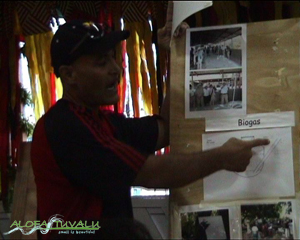 |
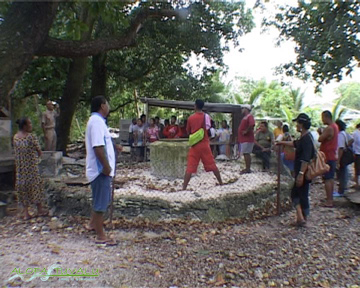 |
Rivalry in communities is a human common issue. TMTI & Amatuku are not exempt of it. Situation degraded over the years.
After the departure, in 2006, of an Australian captain and 3 temporary leaderships, 3 to 12 months missions, a Tuvaluan captain was appointed. This did not satisfy everyone. After 2 years in place, he and his second had to leave, following the mutiny… |
Most things stopped for several months.. till another Tuvaluan captain was nominated. In 2012, the very active and embracing new chief officer, enthusastic about biomass technologies, suggested the school would buy pigs for the students... and with the chief engineer that had followed the whole biogas and biofuel operations, volunteered to put back the plant in order.


The many years demonstrating, training and communication campaigns about biogas led, almost immediately, to reproduction requests worldwide including from Madagascar, Senegal, Easter Island… and from Tuvalu.
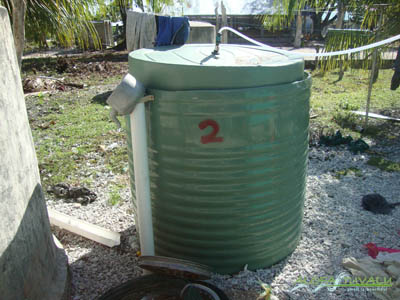 In Tuvalu, the first Biogas reproduction was initiated, in 2009, by Semese Alefaio and Taukiei Kitara, Alofa Tuvalu members, then Tango officers. With Alofa Tuvalu leaflet and videos, they had promoted biogas technology in the outer islands. All islands had expressed interest. Semese and Taukiei asked Alofa Tuvalu to select one of the islands. Tango would cofinance with a GEF Small grants. After a couple surveys by Sarah Hemstock (AT biomass specialist), Nanumea, the furthest North from the capital. For weight transportation and cost issues, we wanted this new project to be made of plastic. From a pile of litterature and sketches we gathered, Sikeli Raisuqe designed, built and tested a prototype. The project including 4 plastic digesters, 4 supplementary water tanks, pigpens and gardens was finalized in 2012. In Tuvalu, the first Biogas reproduction was initiated, in 2009, by Semese Alefaio and Taukiei Kitara, Alofa Tuvalu members, then Tango officers. With Alofa Tuvalu leaflet and videos, they had promoted biogas technology in the outer islands. All islands had expressed interest. Semese and Taukiei asked Alofa Tuvalu to select one of the islands. Tango would cofinance with a GEF Small grants. After a couple surveys by Sarah Hemstock (AT biomass specialist), Nanumea, the furthest North from the capital. For weight transportation and cost issues, we wanted this new project to be made of plastic. From a pile of litterature and sketches we gathered, Sikeli Raisuqe designed, built and tested a prototype. The project including 4 plastic digesters, 4 supplementary water tanks, pigpens and gardens was finalized in 2012.
Late 2012, Teuela Manuela, Alofa Tuvalu biogas coordinator in Nanumea, asked for a Tuvalu biogas synthesis from 2005 for the Ministry of Home Affairs. This paper helped feed a EU/USP application for the reproduction of 7 units in Nanumanga. A fund managed by Sarah Hemstock at USP. Implementation started mid 2013 with the trained team (Teuela, Kaio) and biogas specialist Sikeli Raisuqe.
NOTE: The second planned plant, a 6m3 digester fuelled by human waste produced by TMTI students was not implemented. When preparing with the local teams and users, we stressed the fact that implementing the 2nd digester was possible under 2 conditions: 1-The pig manure digester had to be working to satisfaction AND be taken care of by the users … 2-It should fit the schedule of the Amatuku renovations… mainly for plumbing issues. Renovation happened before point 1 was sustainable. We invested our energy in other areas and did many other things instead.


Since 2006, agreements have been in place with TMTI and the Tuvalu Copra Trading Corporation (TCTC - a Government of Tuvalu initiative). In addition, meetings with community and interest groups (women's groups, farmers, other NGO's, church groups, Government Departments – including Tuvalu Electricity Corporation (TEC), etc – totalling over 800 people in attendance have demonstrated community support and commitment to this project.
After discussions with all partners, and according to other RET projects being developed on the archipelago, the biomass awareness and demonstration projects evolved into "Tree of life", adding to the originally planned biodiesel demonstration and production, 2 other energies from coconut trees: bioethanol and gas from gasification of husks and shells.


The first step of the Tree of Life took place in 2008, in a tense international context relating to biofuels. Gilles Vaitillingom (CIRAD/Alofa Tuvalu) put together a public bench-scale demonstration of Biodiesel, and Bioethanol production and a public Workshop on gas production from a prototype gasifier built from equipment available onsite by TMTI engineers.
Biodiesel / Todi ethanol
The first public meeting took place in Funafuti. With in situ test productions of copra biodiesel and todi ethanol, it demonstrated, in front of 200 people, the merits of local production for local transportation.
There were relatively few coconut oil fuel projects in the Pacific region. The majority of these diesel substitute replacement projects use straight coconut oil and require specifically modified engines. To avoid such costly engine modifications, Alofa Tuvalu set a target to produce biodiesel with a higher fuel specification than straight vegetable oil which can be used without modifying the engines currently used. The 2008 small scale on-site biodiesel demonstration produced a fuel that was composed of 80% ester. It was used in an unmodified diesel engine using a blend of 10% diesel. A unit with an oil heater and stirrer could produce 90% ester which can be used blended with diesel (80% + 20% diesel ester) to keep in line with international standards for diesel fuel. A clever use would be to substitute ¾ of this ester diesel with bi-carburation. This practice is applicable to any size diesel engine, and will suit the inter-island vessels. |
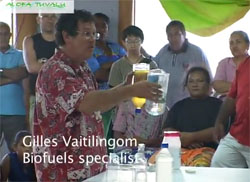
2008 Coconut biodiesel & todi ethanol production demos on

|
For ethanol, the objective was simply to demonstrate that petrol could be produced from the local fermented alcohol: the todi made from coconut sap. This coconut "wine" contains in between 6 and 10% of alcohol. 27 liters can be collected per day and per tree.
The principle is that of distillation. By heating the liquid to ethanol boiling temperature, the ethanol turns into vapor that can be collected once condensed. The whole apparatus is called a still. All accessories to build the distiller were found in the local Funafuti shops: a 3 liter boiler, an aluminium cooking pot, plastic pipe. The only thing that had to be bought in Fiji was 5 meters of copper tube.
3 liters of todi were distilled to obtain 350ml of an alcohol containing 75% of ethanol. With a reflux column still, it would be possible to extract ¼ liter of alcohol at 90-95% volume with the same 3 liters of todi, a potential of 2,25 liters of petrol per day and per coconut tree, enough for 2 scooters.
Even with a low alcohol content, the audience started the scooter fed with the todi ethanol with no difficulties.
In Tuvalu, 1/3 of the petrol is used for fishing small boats, and 2/3 for the few cars and the crowd of scooters on Funafuti. Applying it to fishing boats is feasible when mixed with petrol under the condition of using solubilization to insure the mix stability. However, we decided not to go further with Ethanol production. Alcohol had never been distilled in Tuvalu and making it available may have consequences that we could not control.
The unexpected influx of participants, the number of relevant questions and requests for reproductions raised by participants, revealed the interest of the Tuvaluan people and their willingness. In parallel, tests conducted at CIRAD (Montpellier, France) on the likely biodiesel production unit allowed us to consider sustainable and innovative onsite implementations.
Gasification
A week later, the 2nd public demonstration took place in Amatuku.
Our global objective was to demonstrate and train on technologies that have not been developed in Tuvalu not to replicate what others have done or are doing. While working on biomass technologies, other projects were happening with Tuvalu Electricity Company. A Danish company installed a anemometer for wind measuring, a Japanese company installed solar panels on the stadium roof and a GEF/Piggarep solar project was implemented in Vaitupu… There was no more need for wind or solar to be demonstrated. Instead, we chose to go further with biomass… The 2005/2006 Alofa Tuvalu energy/waste audit outlined that landfills are composed of 80% organic waste valuable as compost or gas. Therefore, along with the todi ethanol that was not part of the original project, we decided to introduce the population to another biomass technology : gasification.
In 2008, more than 50 people were introduced to gasification of husks and shells process for electricity production. The gasifier used for this first training course has been sized and designed for non burnt biomass and was constructed, by 6 TMTI engineers and teachers, locally from materials available on Amatuku. 12 students were trained and 40 people attended the workshops.
The concrete used was not refractory so its life is limited. With refractory concrete we can expect a life of a year before having to cast a new furnace. To use the gas produced to fuel an engine, a gas cooling and filtration unit is required to eliminate ash and dust.
A unit gasifier and filters can run a generator on a dual-fuel mode, substituting around 75-80% of diesel use. To make the gasifier a model for other islands and their generators, it is reasonable to adopt a proven model of gas generator. Both the gasifyer and generator will be imported and filtration units will be constructed on site. A possible solution would be to manufacture the generator in Fiji where all the metalwork skills exist.
In small Pacific states, the coconut tree has great renewable potential in shells and husks of about 32 kg per tree per year. The equivalent of 7.5 liters of diesel used in generators. With 10 kg of coconut shells 25 m3 of gas can be produced, equivalent to 2.75 kg of liquid butane.


In 2009, the second step consisted on purchasing, shipping, training & implementing 2 commercial biodiesel and gasification units. The smallest Units found on the market (Fuelpod & Gek) to fit the Training center parameters are able to provide all of the electricity required in each of Tuvalu's outer islands (apart from Vaitupu).
- The objectives were to create a biodiesel able to be used at 100% in the gerenators without having to modify the engines.
Units arrived after 3 months shipping. These small units are able to provide the whole of the electricity required in each of Tuvalu outer islands. The biodiesel unit successfully tested at CIRAD (Research Unit Biomass-Energy) can transform 60 liters of oil into biodiesel per 8 hours. At least 95% ester can be obtained. The gasifier unit can reduce up to 70% of the diesel required.
Tuvalu is so remote that shipping the selected equipment from the UK and California, as well as the products needed for its operation (methanol from Fiji, coconut oil from the outer islands etc), required the unified efforts of many people from France, Netherlands, the US, New Zealand, Fiji and all islands of Tuvalu. Many unexpected expenses and delays had to be addressed such as postponement of the 3 cargos carrying our equipment from Suva to Tuvalu and surplus shipping costs from California. After 3 months and despite many complicated administration processes, Gilles Vaitillingom was able to check, test and demonstrate the equipment to curious Tuvaluans, before shipping it to its final destination - TMTI (Tuvalu Maritime Training Center), Amatuku.
With the ultimate objective of TMTI and the nation of Tuvalu on the road to energy security via use of its own biomass and waste resources, the aim of Gilles' mission was:
¬ To install 2 pilot units : one able to produce Coconut Oil Methylic ester, and a gasifier to produce gas from coconut husks and shells.
¬ To train the TMTI's engineers and staff.
¬ To introduce the technologies to the Tuvaluan population.
The 2 units were selected according to the following parameters :
Commercialized and quality units – reliability.
- Small size but able to produce enough quantities to be used in real application.
They are good educational tools, with a simple and clear concept..
Production was first done as a training for the TMTI engineers.
Over 3 weeks, the training of 6 engineers and teachers on the 2 technologies was achieved.
During these processes, 110 liters of coconut oil were esterified in 4 batches (3 x 30 Liters, 1 x 20 liters). Each batch showed an acidity inferior to 1%. This can be explained by the very good quality of the coconut oil made from fresh fruits.
For the gasifier, the kit chosen for Amatuku needs little assembly. However, a crucial piece of the kit, the fan, was missing causing a serious problem. Its replacement with the spare local tools took days for the engineers. The fan manufactured locally, powered by a 12v car battery, was used as a pump to pull air through the burner, allowing the gas to be produced.
Despite this issue, after 3 weeks of training, the team successfully demonstrated how to run these units and usage of the biodiesel produced.
The first public workshop was a great success and the talk of town. 200 people attended including 2 ministers, many Got officers, communities and churches representative. Everyone on the capital who could not make the trip got the news almost live on radio Tuvalu.
From the moment the biodiesel demo started, Ministers to housewives, everyone in the audience was amazed. For the gasifier, the team had good reasons to be doubtful about the home-made fan… However, Gas was produced in less than 2 minutes !
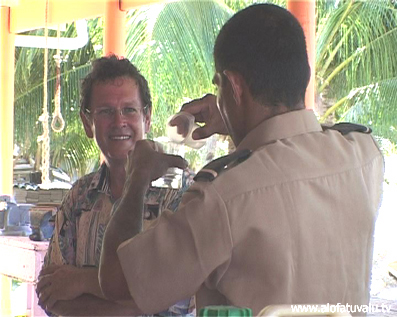 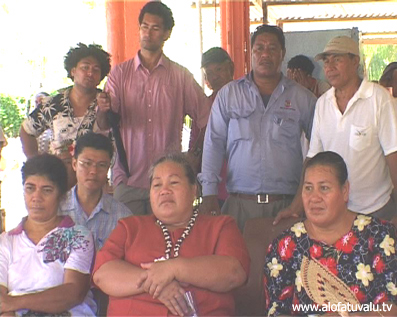 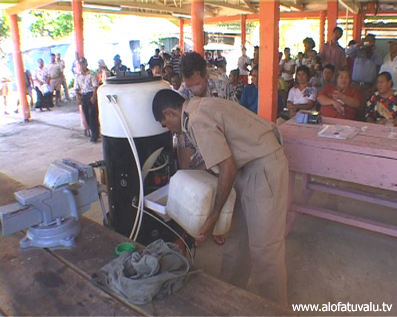
Same results with the 100% Biodiesel fueled generator… Not one hiccup.. not an hesitation. The demonstration was impressive: the generator pulled up 2 training cranes which had not been used in a decade.
2nd public workshop on June 5th for Environment Day
After this first success decision was taken to participate in the Tuvalu activities for Environment Day, with a second biodiesel and gasification workshop… facing the enormous challenge to do it in the absence of Gilles and 2 TMTI fully trained engineers… and with a fan which had been predicted to last for one demo only.
So many people registered to be in the 4 boats taking the audience to Amatuku, that we had to ask a former Prime Minister who had seen the first demo to give his seat. The TMTI chief caterer who had some chemistry background led the biodiesel demonstration. An engineer and a teacher took charge of the gasifier demonstration. The demonstrations ran a little less smoothly than the first demo but the Captain himself, absent at the first demonstration, was amazed that with so « little » training both technologies worked.
As during the first workshop, the biodiesel demonstration was an amazing performance. proving not only the quality of the production but also of the training Gilles Vaitillingom administrated.
Gas took a bit longer to be produced by the gasifier: too much moisture in the burning coconuts but everyone could observe the flame after 10 minutes.


The decision by the Captain to send away for several months most of the staff that had been trained put a temporary stop to the activities that the school could have undertaken with the coconut oil we offered to supply. 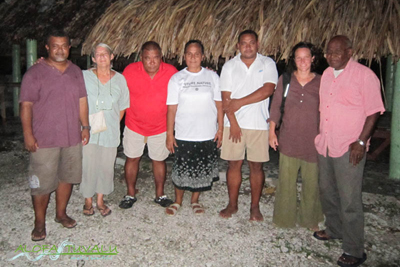
Gilles Vaitillingom had planned to make the trip in 2010 with updated equipment and spare parts to fit specific needs and allow a sustainable use. The international disturbance in air transportation due to the Iceland volcano and the local mutiny did not allow him to return.. Late 2011, the second gasification unit and biodiesel spare parts were hand delivered to TMTI when Gilliane, Alofa Tuvalu president, and Fanny, project general coordinator, made the trip. Several meetings took place with the new captain and head engineer who both committed to reinstall the equipment for biodiesel and gasification units to use them again.
Same as for the biogas, the few years developing and communicating about the project initiated several requests to reproduce Alofa Tuvalu biodiesel/bioethanol & gasification production activities, including from Tuamotu, Wallis and Tonga. Training in biodiesel production will be of great benefit to the Pacific region.
In Tuvalu, in 2012, the energy department made a request to use the equipment for a biofuel roadshow in the outer islands. We put them in contact with the captain and the trained engineers for them to do the demo together. The biofuel roadshow is now in the hands of A.T. biomass specialist, Sarah Hemstock, today Project Team Leader for USP EU Global Climate Change Alliance Project.
The production of the 'tree of life' technologies needs to be done in a way which will ensure sustainable use of resources without competing with food needs. The biodiesel and todi ethanol feasibility studies analyzing all parameters was restituted by Sarah Hemstock in 2010 to the Permanent secretary and head of concerned department. The reintroduction of a small local industry for copra would have multiplier effects in Tuvalu where production could reach 700 000 liters per year and gradually replace 50% of the diesel used in the 2 inter-island boats whilst providing income for some 700 subsistence farmers and families. Developing ethylic esterification, with ethanol from Todi rather than imported methanol for 10% to 20% of the mixture, could be a developed in partnership with the local branch of the University of the South Pacific laboratory.


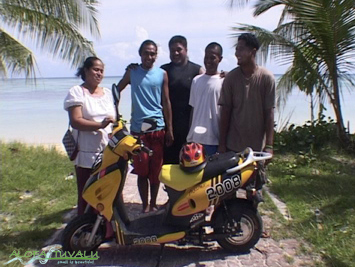 In parallel with the biomass technologies demonstrations, implementation and training, since 2005, Alofa Tuvalu undertook many other activities: from waste awareness, multi-activities workshops (King Tides Festival, Ka Lofia Te Paneta) and many debates and screenings about climate change and energy issues. Other activities include organic seeds distribution… electric scooters and solar ovens demonstrations… Tuvaluan translation of the comic books "our planet under water". For 2 years programs Alofa Tuvalu produced series of short programs that aired daily for 3 months « 100 things you can do to help Tuvalu... and YOU… ». Themes were based on waste and energy efficiency. The only activity that was not related to energy is the Tuvalu Marine Life, a study and publication. Another 7 years endeavor. In parallel with the biomass technologies demonstrations, implementation and training, since 2005, Alofa Tuvalu undertook many other activities: from waste awareness, multi-activities workshops (King Tides Festival, Ka Lofia Te Paneta) and many debates and screenings about climate change and energy issues. Other activities include organic seeds distribution… electric scooters and solar ovens demonstrations… Tuvaluan translation of the comic books "our planet under water". For 2 years programs Alofa Tuvalu produced series of short programs that aired daily for 3 months « 100 things you can do to help Tuvalu... and YOU… ». Themes were based on waste and energy efficiency. The only activity that was not related to energy is the Tuvalu Marine Life, a study and publication. Another 7 years endeavor.

|
